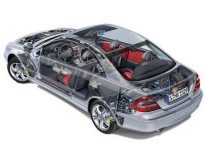
RFID technology makes car engines more efficient
[ad_1]
The rapid development of RFID technology has been recognized by more and more fields. The power of automobiles has always been a major selling point of automobiles. Low fuel consumption and high efficiency have become a major focus of automobile research and development. RFID technology can also reduce the idling time of car engines and improve engine efficiency.
At present, the trend of oil prices has been rising, and different technologies are used to improve the efficient operation of the car’s engine. Coupled with the measures implemented to reduce the impact of greenhouse gases on global atmospheric climate change, it is obvious that how to take measures to improve fuel efficiency and reduce gas emissions has become a major measure of environmental protection.
An important area where technical solutions are used to reduce fuel consumption and carbon dioxide emissions is mobile device management. This solution uses advanced technology, supplemented by comprehensive analysis and management software, to provide fast-responsive managers with real-time monitoring and analysis of fleet performance. Mobile equipment management solutions streamline processes and maximize the performance of mobile equipment by tracking and monitoring vehicles, machinery, trailers, ships and cargo, as well as drivers and operators.
More advanced mobile device management solutions will include GPS navigation, wireless communication technology and Internet access. In addition, vehicles must be equipped with telemetry sensors (wireless or wired), RFID readers and communication equipment. The information collected by these technologies can facilitate online interaction with the fleet, work process automation and real-time in-depth cost analysis of key business decisions. This comprehensive solution can bring the best implementation methods to advanced fleet management, real-time labor management, communication and information, vehicle maintenance and diagnosis, route and resource utilization efficiency, cost management, advanced analysis and management reports, etc.

Install a mobile device monitoring system on the car, and implement real-time alarms through portable devices, so that the fleet manager can learn about special situations without the need to continuously monitor each car in the fleet. Monitoring equipment can be connected to any electronic system, and these electronic systems that evaluate various components of the car include fuel sensors, odometers, speed indicators, engine controllers, brakes and launch computers. RFID readers track the driver’s location and activity data by identifying ID, and obtain information about the goods through RFID tags on pallets or items. These data are first transmitted to an on-board computer, and then transmitted to the data center of the monitoring system through mobile communication technology.
The RFID mobile device management system enables users or managers to confirm which measured values of certain components constitute abnormal operating conditions and then fine-tune the standards. Information and alerts about abnormal conditions are sent to users or managers through the most effective mechanism (note: e-mail, voice mail, website, mobile device, or SMS, etc.). For those organizations seeking to reduce fuel consumption and carbon dioxide emissions, RFID mobile device management systems can bring great benefits.
In this battle to improve vehicle fuel efficiency and reduce emissions, properly trained drivers are the company’s best asset. With the RFID mobile device management system, drivers and operators can obtain the latest information and standards in terms of fuel-saving and emission-reduction technologies (note: for example, keeping tires inflated, driving in a timely manner, limiting vehicle overweight, etc.). Many current RFID mobile device management systems can customize driver scoring systems, which take into account many of the criteria listed above.
Drivers often leave their engines idle and serve as power supplies for heating and air conditioning equipment, ventilation equipment, food preparation and storage equipment, lighting and entertainment facilities. Idling quickly consumes fuel, which is equipped for the driver’s delivery route based on the predicted mileage. The RFID mobile equipment management system can report the idling mode in detail, and point out when and where it can maximize fuel savings and reduce emissions, while minimizing the impact on operations. Based on these reports, managers can consider choosing the following engine idling modes: shore power (provided 120V alternating current to the driver when the truck is stopped), generator (external energy to provide electricity to drive the driver’s entertainment equipment) and inverter (replace 12V) The DC power is converted to 120V AC, so that the driver can use any AC equipment).
The rapid development of RFID technology will enable it to be applied in many fields. RFID technology has effectively improved work efficiency, strengthened quality control, and promoted efficient and intelligent production. How RFID technology can make automobile engines more efficient and reduce exhaust gas Emissions make the sky more blue!
[ad_2]



